Howard Andrew Jones's Blog, page 21
June 19, 2017
Woman of Wonder
 We finally slid away to catch Wonder Woman this weekend and it was far better than I expected. Some people talked about rough dialogue and others complained about special effects (I never understand that, really – how do those people get by when they’re seeing old movies, or attending the theatre?). Others said it wasn’t as good as the hype.
We finally slid away to catch Wonder Woman this weekend and it was far better than I expected. Some people talked about rough dialogue and others complained about special effects (I never understand that, really – how do those people get by when they’re seeing old movies, or attending the theatre?). Others said it wasn’t as good as the hype.
I figured I’d end up coming away in agreement with all three, because A.) most science fiction/fantasy shows end up with slavish devotees regardless of a show’s quality, and B.) people wanted to like it. But I found it an enjoyable and exhilarating and sometimes moving summer blockbuster. It achieved everything that the first Captain America managed occasionally to do (or, more fairly, throughout its first half and sporadically thereafter) and did it over the course of its entire run.
I wasn’t entirely convinced by the villain, but that’s not so much the film’s fault as the back history the character is saddled with from the comics. I wasn’t entirely clear about how Wonder Woman’s powers developed or what made them more or less awesome throughout. But I really liked her character, and her character arc, and her decision points, and her relationship with Steve Trevor. The characters were so likable and earnest and good. Ye God, but it was nice to see a movie about decent people determined to do the right thing, even at cost of their own lives and at risk of their careers. Pine’s Trevor was more Kirk-like than the nuKirk scripted into the Trek reboot movies.
(As an aside — I loved that Wonder Woman had to TRAIN to earn her martial prowess, that she wasn’t just destined for greatness, and that she had to achieve wisdom through suffering and experience. Duty and responsibility, people. We need to see more heroes that remind us of that.)
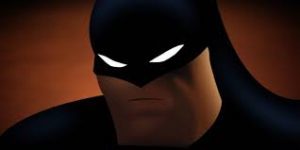 I walked away feeling good and wishing my daughter hadn’t already headed off to be a camp counselor, because I would have liked to have heard her reaction. It was the best DC movie I’ve seen in years, possibly the best yet. Certainly it seems the truest to the conception of the character, so DC finally got that right. Superman is NOT a killer, nor is Batman, and Batman’s super power isn’t that he’s rich, it’s that he’s the smartest man in the room and that he never, ever gives up. The only media depiction that’s ever gotten THAT right was the Batman Animated Series and its spinoffs, and I wish that the movies would cue off of them.
I walked away feeling good and wishing my daughter hadn’t already headed off to be a camp counselor, because I would have liked to have heard her reaction. It was the best DC movie I’ve seen in years, possibly the best yet. Certainly it seems the truest to the conception of the character, so DC finally got that right. Superman is NOT a killer, nor is Batman, and Batman’s super power isn’t that he’s rich, it’s that he’s the smartest man in the room and that he never, ever gives up. The only media depiction that’s ever gotten THAT right was the Batman Animated Series and its spinoffs, and I wish that the movies would cue off of them.
Marvel gets that a lot of the people coming to see these films wants to see the hero that they remember from the comic books, not someone’s reinterpretation. Maybe DC will finally clue in.
And perhaps it’s obvious, and I’m sure it’s been discussed in far greater detail in other places, but it was great to see a woman action star in the lead, playing a character that women would want to emulate. When growing up I had the X-Men and Captain America and The Falcon (well, The Falcon, really, because notwithstanding I was a really pale white kid I wanted to be him more than Cap) Captain Kirk and Luke Skywalker and Conan and James Bond and God alone knows how many others.
My wife didn’t have anything close to that range of choice. I think future generations of women will be far better off. It surely matters that a woman directed the movie, yet I hope for a day when a woman director will be so common that it won’t even be worth remarking upon.
June 16, 2017
Reviewing
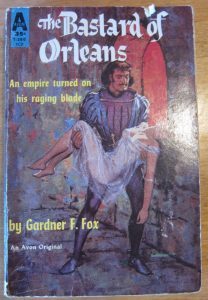 I finished Gardner Fox’s The Bastard of Orleans the other day. It sure started strong, and in the first 40-60 pages I thought I might be reading another one as strong as The Borgia Blade. It turns out that despite surface similarities (great action scenes and some old-style “spice”) that it was designed with different effects in mind.
I finished Gardner Fox’s The Bastard of Orleans the other day. It sure started strong, and in the first 40-60 pages I thought I might be reading another one as strong as The Borgia Blade. It turns out that despite surface similarities (great action scenes and some old-style “spice”) that it was designed with different effects in mind.
As I contemplated this review my first instinct I remembered to consider what I always wish other reviewers would do and thought about the novel on its own terms. I believe this book was intended to achieve a different effect than the one I enjoyed more. It was a historical intended to have great action scenes and titillating sex scenes, or scenes with sexy descriptions of women. Fox delivered these things very well, and if that’s what you went in looking for, you’d be very happy.
The Borgia Blade did both of those things as well, but with a little less emphasis on the whole “sexy scenes” department and more emphasis on plot and character (and led to a really thrilling conclusion). It felt as though almost a third to a half of The Bastard of Orleans was devoted to spicy stuff. This left less time for character development or more than a loose/basic plot structure, and the conclusion was a little perfunctory as a result. Characterization was a little basic, so that I never completely understood some of the character’s choices. Why, for instance, he was so in love with beautiful woman 1. rather than beautiful woman 2, of whom he was clearly quite fond and who was devoted to him almost from the first moment they met. Neither woman was written with enough character detail so that I could form an opinion of my own, apart from my disappointment that the protagonist didn’t reward loyalty and affection with loyalty and affection of his own.
Since I was looking to find another “Borgia Blade” I came away disappointed, but I can bet that if I’d read this when I was in my teens I would have been thrilled. Knowing now what I know about writers having to tailor for markets, I’m going to try some more Gardner Fox that was written for Gold Medal or Crest, the publisher of The Borgia Blade. I’ll report what I find here. I do love a good swashbuckler.
June 14, 2017
Pacing and Drafting
 Following up on my post about the strengths of hardboiled fiction I come to the strengths of some of these old historicals. I’m about halfway through Gardner Fox’s The Bastard of Orleans. Maybe the characterization isn’t anything for the ages, but man, am I being swept along by the pace and the surprising turns. Scenes of great color and action, lots of momentum, and plenty of lovely ladies. By page 40 more stuff had already happened than what often happens in a hundred pages or more of modern fantasy stuff. Will I love it as much as I loved The Borgia Blade? I’ll know by the end. Right now I’m looking forward to seeing what happens next.
Following up on my post about the strengths of hardboiled fiction I come to the strengths of some of these old historicals. I’m about halfway through Gardner Fox’s The Bastard of Orleans. Maybe the characterization isn’t anything for the ages, but man, am I being swept along by the pace and the surprising turns. Scenes of great color and action, lots of momentum, and plenty of lovely ladies. By page 40 more stuff had already happened than what often happens in a hundred pages or more of modern fantasy stuff. Will I love it as much as I loved The Borgia Blade? I’ll know by the end. Right now I’m looking forward to seeing what happens next.
I had it in mind as I was thinking about pacing. I’m always thinking about pacing, but I’ve found myself contemplating it even more in the last few weeks. I’m wrestling with the middle section of my novel and wondering why it’s not fast enough to please me.
I think one of the problems we’ve gotten into is, as I mentioned, a market demand for big fat novels. I tried to buck that trend but the market didn’t like it, so now I’m trying to write novels that, if not fat, are still longer. But I’m also trying to give them the only kind of pacing I can tolerate.
This presents complications. With a longer narrative there’s so much going on that when I switch point of view characters I have to spend a lot of time catching people up on what’s happened. In its first draft, I’d written about fifteen pages of what amounted to a briefing, telling what was about to happen and why the characters were being sent here and what their reactions were. I put the entire draft aside to make changes to novel 1 for about four months, and when I came back I didn’t much care what I found. I cut the scene completely and decided my characters would already be en route towards this mission and just flashback to important moments from the assignment scene… but after I did that it still bored me, so I ended up summarizing.
Yesterday I took a hatchet even to the summarizing to cut it down to its bare bones. On with the adventure!
June 12, 2017
Link Day
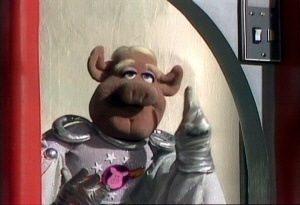 First, I’m overdue pointing you towards a fundraiser for Robert Zoltan’s Literary Wonder and Adventure Show. He and Edgar the Raven are seeking backers to keep bringing you interviews and information about your favorite writers and genres. Check it out! Robert’s a great guy and huge fan of the genre, and very supportive of his guests. And Edgar the Raven is a hoot. Or, rather, a caw.
First, I’m overdue pointing you towards a fundraiser for Robert Zoltan’s Literary Wonder and Adventure Show. He and Edgar the Raven are seeking backers to keep bringing you interviews and information about your favorite writers and genres. Check it out! Robert’s a great guy and huge fan of the genre, and very supportive of his guests. And Edgar the Raven is a hoot. Or, rather, a caw.
Second, here’s a cool article written by someone who attended one of the woman-only showings of Wonder Woman. I’ve yet to get to the show (it was sold out BOTH times my wife and I took the kids to see it, this weekend AND last), but I hear good things. This article better made me appreciate how empowering it must feel to women viewers.
Third, as long as we’re talking about getting better appreciation on female perspectives, here’s an insightful article by none other than Paulina Porizkova, a woman I have to admit I was first made aware of (in my high school years) because she was stunningly beautiful. Turns out that she’s a gifted essayist. I started reading this article aloud to my wife while my son was in the room and after a paragraph or so BOTH stopped what they were doing so they could listen with their full attention.
Fourth, I’m about halfway through a short western written by “Al Conroy” which is a pseudonym of Marvin Albert. This happens to be the third novel, under a third pseudonym, I’ve read by the guy in the last six weeks. I remain impressed, and will write about him more thoroughly fairly soon. To date I’ve read one of his hardboiled detective novels (written as Nick Quarry) one of his action adventure novels (written as Ian Macalister) and am now enjoying one of his westerns (written as Al Conroy). So far, highly recommended, even if this detailed article only identifies him as “often quite good” rather than top drawer. I guess I’ll have to look harder into the very best Gold Medal writers, because this guy’s dependably impressing me.
June 7, 2017
Gardner Fox Swashbucklers
 Back in 2015 I was pretty thrilled by Gardner Fox’s old historical The Borgia Blade. You can find that review here. I was quite pleased by that one, and a little surprised, as I had abandoned his Kothar sword-and-sorcery stories after several heroic efforts on my part. The Borgia Blade was in a whole different category, as you can see from my review.
Back in 2015 I was pretty thrilled by Gardner Fox’s old historical The Borgia Blade. You can find that review here. I was quite pleased by that one, and a little surprised, as I had abandoned his Kothar sword-and-sorcery stories after several heroic efforts on my part. The Borgia Blade was in a whole different category, as you can see from my review.
I’ve since read another by him still far better than Kotahr, but not in the same class as The Borgia Blade, which was so good I’ve continued to search for more gold in his body of work, aided by a list from my friend Morgan Holmes (sword-and-sorcery scholar extraordinaire) that had a whole slew of Fox’s historicals under his own name as well as those written under pseudonyms.
First up (just as soon as I finish some other books) is The Bastard of Orleans. After that will come another Gold Medal paperback, perhaps Terror Over London. I’ve never shared the fascination with Jack the Ripper that many people have, but Chris Hocking tells me that this book is supposed to have a good reputation.
 When I read The Borgia Blade I was unaware of the reputation for excellence held by the editors of Gold Medal back in the day, skills that might account for them getting the absolute best from Fox. I’ve heard that some of these other books are supposed to be really strong as well — although I’ve also heard from none other than Hocking that one of Fox’s Gold Medals, Queen of Sheba, was terrible. An exception, we think, at least for Gold Medal. I’ve been reading a lot of stuff from that famous old line and all of it has been good to great. If only I’d known sooner when those Gold Medal books were easier, and cheaper, to lay hands on! But I wasn’t ready to try that yet, because I was still finding my way through the fantasy and sword-and-sorcery field.
When I read The Borgia Blade I was unaware of the reputation for excellence held by the editors of Gold Medal back in the day, skills that might account for them getting the absolute best from Fox. I’ve heard that some of these other books are supposed to be really strong as well — although I’ve also heard from none other than Hocking that one of Fox’s Gold Medals, Queen of Sheba, was terrible. An exception, we think, at least for Gold Medal. I’ve been reading a lot of stuff from that famous old line and all of it has been good to great. If only I’d known sooner when those Gold Medal books were easier, and cheaper, to lay hands on! But I wasn’t ready to try that yet, because I was still finding my way through the fantasy and sword-and-sorcery field.
Why oh why am I reading so much older fiction? Well, when it’s good, it seems to be head and shoulders above a lot of what’s written today. Stronger pacing, leaner yet more descriptive prose. More understatement rather than emotional moping. And NO PADDING. Put that way, it probably makes a lot of sense.
June 5, 2017
Max Thursday
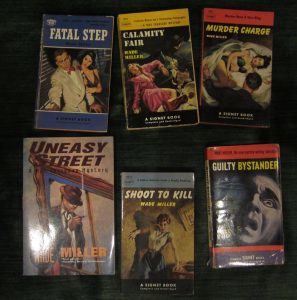 These six books are among the finest detective stories I’ve yet read, with honest-to-God mysteries, cracking pace, and a relatable hero. The first one is what helped convert me to a Wade Miller fan.
These six books are among the finest detective stories I’ve yet read, with honest-to-God mysteries, cracking pace, and a relatable hero. The first one is what helped convert me to a Wade Miller fan.
I intend to discuss them, and some of my other favorite Wade Miller titles, with Chris Hocking in an upcoming post. As I think we once mentioned, don’t go reading discussions, because many of those who discuss the novels carelessly reveal the solution to the mystery. And these really are so tightly plotted you’ll be hard pressed to know what’s going on until the end, so that kind of indifference is inexcusable. These are highly crafted mysteries.
I was just eager to read them — I didn’t mind if my editions were mis-matched, hence the different cover styles and sizes. You’re lucky. So long as you don’t mind e-books, you can find the whole set right here.
June 1, 2017
Rime
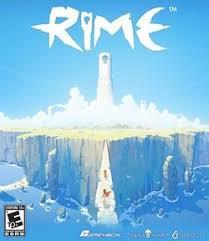 We’re not big video game players in my house. Every winter my wife and son break out some old video games — usually Zelda or Zelda like bright, friendly adventure/quest games from older platforms — and that’s about it. We’re not up on the latest graphic breakthroughs or gameplay techniques, so that if someone states that a game has “dated graphics” or has puzzles that are “too simple to solve” I’m generally not worried: A. even dated graphics usually look just fine to us, because they’re probably at least as good as the ones we’ve seen played B. people who regularly play games are more used to solving certain puzzles a certain way, and we haven’t seen them.
We’re not big video game players in my house. Every winter my wife and son break out some old video games — usually Zelda or Zelda like bright, friendly adventure/quest games from older platforms — and that’s about it. We’re not up on the latest graphic breakthroughs or gameplay techniques, so that if someone states that a game has “dated graphics” or has puzzles that are “too simple to solve” I’m generally not worried: A. even dated graphics usually look just fine to us, because they’re probably at least as good as the ones we’ve seen played B. people who regularly play games are more used to solving certain puzzles a certain way, and we haven’t seen them.
This winter, though, we didn’t play much. I guess we were tired of the same old games, finally. I wasn’t able to track down any new ones, and so the wife and son in particular were still wanting a fun diversion.
All of this might explain why we initially enjoyed Rime this May. A lot. I got it for my wife as a late Mother’s Day present, because it seemed like a family-friendly exploration/puzzle game playable on Xbox One, a platform that seems to delight in releasing dark and gritty titles much more than bright ones. In Rime we found a splendid interactive environment where the main character could climb where you thought he could climb, and swim, and jump, and all that. The puzzles might have been simple for a long-time gamer, but they were just our speed. And the animation was nice and the scenery gorgeous. I’ve seen reviews saying that the gamplay was derivative and hardly ground breaking, but we who didn’t know enough to be snotty about it thought it looked great.
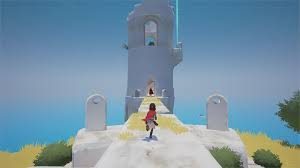 So you see, it seemed like a winner… until the conclusion just sort of happened. The story was building nicely, but by the time we got to the final level we were shocked that it WAS the final section. The game just kind of ended with one of the most thoroughly terrible resolutions I’ve ever seen. My guess is that the team ran out of money. I’ve never been more thoroughly dis-satisfied with a modern game conclusion. I’m sad to say that as a result I don’t recommend it. You see, we may not be up on game development and technology, but we know a good story when we see one, and this wasn’t.
So you see, it seemed like a winner… until the conclusion just sort of happened. The story was building nicely, but by the time we got to the final level we were shocked that it WAS the final section. The game just kind of ended with one of the most thoroughly terrible resolutions I’ve ever seen. My guess is that the team ran out of money. I’ve never been more thoroughly dis-satisfied with a modern game conclusion. I’m sad to say that as a result I don’t recommend it. You see, we may not be up on game development and technology, but we know a good story when we see one, and this wasn’t.
As a side note, if anyone can suggest an Xbox One fantasy adventure title that doesn’t involve assassins or demons or a whole bunch of blood and gore, or that’s essentially optimistic (my wife has enough stress and negativity at work, thanks), I’d love to hear about it.
May 30, 2017
In Thanks
 On Memorial Day I woke early, fully intending to play some of my solitaire wargames, probably Heroes of Normandy. But I turned instead to the revision of a World War II short story I’d been working on, the second of two I’ve written about the United States Airborne.
On Memorial Day I woke early, fully intending to play some of my solitaire wargames, probably Heroes of Normandy. But I turned instead to the revision of a World War II short story I’d been working on, the second of two I’ve written about the United States Airborne.
As I’ve grown older and grown a little wiser, I’ve come to appreciate the sacrifices of our veterans, many of whom were not as fortunate as my father, who made it back home (to be clear, he wasn’t in the airborne). I’ve been thinking about these men and women a lot more in the last year as I’ve been researching World War II, and as I spent a pleasant day with my family yesterday, I tried to savor all the things that I might once have taken for granted. Including the simple joy of all four of us being together and having fun. Even that is a freedom that I might not once have appreciated, and one that might not have been available without enormous risks taken by men and women whom I have never met.
Thank you, veterans.
May 22, 2017
Hardboiled Monday: The Mammoth Book of Private Eye Stories
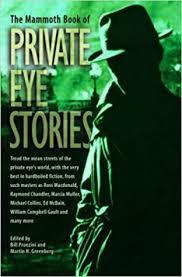 When Chris Hocking and I set out to talk hardboiled fiction every Monday it turned out we (or maybe it was just me) were a little too ambitious. It was hard to keep up the steam, and to keep reading NOTHING but hardboiled for months and months. But we’re returning to discuss great hardboiled fiction as an occasional feature of this web site.
When Chris Hocking and I set out to talk hardboiled fiction every Monday it turned out we (or maybe it was just me) were a little too ambitious. It was hard to keep up the steam, and to keep reading NOTHING but hardboiled for months and months. But we’re returning to discuss great hardboiled fiction as an occasional feature of this web site.
Originally we were discussing all books from this list in order. From here on out we’ll be skipping around. We’ll be trying to cover one subject a month, and I’ll also be trying to provide advanced notice. If you want to see our previous hardboiled discussions, you can access the master list here. Today we’re discussing the well-named Mammoth Book of Private Eye Stories.
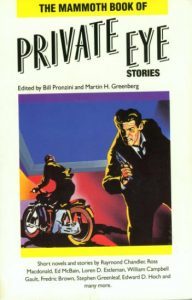 Howard: I had no idea when you recommended this anthology just how good it would be. I mean, you said it was a landmark collection, but I’d read enough anthologies over the years I thought I knew what that meant.
Howard: I had no idea when you recommended this anthology just how good it would be. I mean, you said it was a landmark collection, but I’d read enough anthologies over the years I thought I knew what that meant.
I didn’t, though. This one is stuffed full of the terrific. And those few stories that aren’t terrific are still really good. In fact, there are really only two out of twenty-six stories in here I didn’t like — and one of those is by one of my favorite authors (Chandler, who’s represented here by “The Wrong Pigeon” probably because it was short and rarely anthologized — don’t use it to judge Chandler if you’ve never read him before).
Chris: Yeah, The Mammoth Book of Private Eye Stories is a broad but well-balanced survey of detective fiction that does a good job of both tracing the genre from its pulp origins up until when the anthology was published (1988), and showcasing a number of rarely seen and excellent examples of the form.
Perhaps because of when it was published, there is a greater emphasis on authors of the ‘70s and ‘80s than is seen in most private eye collections. While I might wish for a bit more pulp, this offers a basically unparalleled opportunity to sample the work of several excellent authors whose work, despite being of relatively recent vintage, has become increasingly difficult to find.
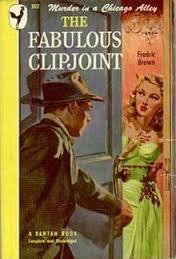 Howard: It’s an impressive collection. It may be the single-best multi-author anthology I’ve ever read. And that’s saying something, folks.
Howard: It’s an impressive collection. It may be the single-best multi-author anthology I’ve ever read. And that’s saying something, folks.
The first tale that really stood out was Frederic Brown’s “Before She Kills,” about a man who’s fairly certain that his wife wants to kill him and hires the detective team of Ed and Am Hunter to protect him. Of course, there’s much more involved in the tale, and to detail it would spoil all the surprises, a real problem, I’m discovering, as I try writing about any of these short stories. Suffice to say that I liked this one well enough that I immediately broke out Frederic Brown’s first novel of Ed and Am Hunter, The Fabulous Clipjoint, and quite enjoyed it.
One of the things that this particular anthology does is put you on the trail of reading more by the writers you really like.
Chris: Yeah, it’s a great portal into the work of a lot of fine authors. Some of them unjustly forgotten.
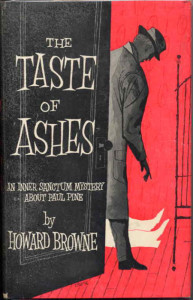 Howard: Right after Brown, of course, comes Browne, Howard Browne, and if I wasn’t already a huge fan of his Paul Pine detective work, after reading “So Dark for April” I’d have immediately sought out more by him. He turns up the Chandler vibe and pulls it off completely without ever sounding like a pale imitation. Great mystery, well told, with beautiful prose.
Howard: Right after Brown, of course, comes Browne, Howard Browne, and if I wasn’t already a huge fan of his Paul Pine detective work, after reading “So Dark for April” I’d have immediately sought out more by him. He turns up the Chandler vibe and pulls it off completely without ever sounding like a pale imitation. Great mystery, well told, with beautiful prose.
Chris: This one has been anthologized a number of times and stands up to multiple re-readings. This is the author’s only short story about his detective character and it’s as good as you would hope. Seems a shame he didn’t write more short stories, but since he gave us A Taste of Ashes I don’t feel like I can complain about anything the guy might, or might not, have written.
Howard: Absolutely. Browne to Chandler is a little like a Beatles cover band that wrote a song at least as good as “Hey Jude” or some other classic, but that no one ever listened to…
I could discuss nearly every story in this book with glowing terms. As I said, even the few weaker ones have moments of excellence, but most are good. But I’m keeping to the really great ones, and the next one that really stood out for me was Joseph Hansen’s “Surf.”
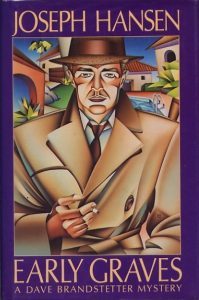 Chris: You don’t hear much about Hansen anymore. Seems as if he gets mentioned it’s as the guy who wrote about a gay private eye/insurance investigator well before that was a common, or even widely accepted, possibility. Seems a shame, as the protagonist’s queer nature is an honest, but generally casual, aspect of the work and his stories are intense, well-characterized and righteous.
Chris: You don’t hear much about Hansen anymore. Seems as if he gets mentioned it’s as the guy who wrote about a gay private eye/insurance investigator well before that was a common, or even widely accepted, possibility. Seems a shame, as the protagonist’s queer nature is an honest, but generally casual, aspect of the work and his stories are intense, well-characterized and righteous.
Howard: It’s a fine mystery, and on finishing it I immediately looked Hansen up and discovered it’s possible to order complete e-collections of all his novel work. I anticipate doing that in the coming year.
Following on that was Edward Hoch’s “The Other Eye,” so well-wrought and so surprising that I really want to read more of his work. I hear he’s famous for “locked room” mysteries, although that broadly means mysteries that seem impossible to solve but have a perfectly rational explanation once it all works out. Like the one in this collection. I’m very interested in seeing how some of his other mysteries DO work out.
Chris: Hoch is an author I know primarily by reputation, which is that of the wizard of a thousand tight little mystery plots. He has a few series characters and one, Simon Ark, sounds irresistible.
Howard: Your mention of Simon Ark was so tantalizing that I just went and looked up an entry about the character – now I want to read some of those stories!
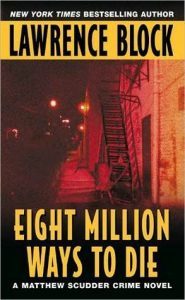 My next discovery was Lawrence Block’s “Out of the Window.” At first I was missing the settings of the previous private eye stories — the ‘30s and so on — but the mystery was so good and the writing so masterful that I got swept along anyway. I’d already been meaning to read more of Block after enjoying Such Men Are Dangerous, but now I’ve got to read the novels of the character featured in this story, Matt Scudder.
My next discovery was Lawrence Block’s “Out of the Window.” At first I was missing the settings of the previous private eye stories — the ‘30s and so on — but the mystery was so good and the writing so masterful that I got swept along anyway. I’d already been meaning to read more of Block after enjoying Such Men Are Dangerous, but now I’ve got to read the novels of the character featured in this story, Matt Scudder.
Chris: This is one of my favorites in the collection. The plot is so easily and casually presented that it doesn’t even feel like a plot. You look back on the story and it’s a fine mechanism, but you have to stop and look to see it. Masterful.
I’ve been working my way through the Scudder novels over the past few years, and they are distinctive and powerful. Eight Million Ways to Die is one of the best detective novels I’ve read in years, coupling a dizzying mystery with the hero’s desperate battle with alcoholism in a fashion that left me almost physically exhausted at the book’s close.
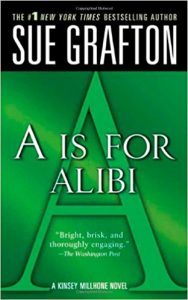 Howard: Sue Grafton’s “She Didn’t Come Home” was a real surprise for me, and a further reminder never to trust a book by its cover. I was really fond of the narrator and the story was impressively delivered — great mystery, tight prose. I definitely wanted to read more by the writer and preferably about the character, and then discovered that the author’s the creator of those books I always rolled my eyes at when I saw them in the bookstores. I thought of them as the alphabet mysteries. A is for Alibi, etc. If only I hadn’t been so judgmental I might have been reading some great fiction years earlier. Live and learn…
Howard: Sue Grafton’s “She Didn’t Come Home” was a real surprise for me, and a further reminder never to trust a book by its cover. I was really fond of the narrator and the story was impressively delivered — great mystery, tight prose. I definitely wanted to read more by the writer and preferably about the character, and then discovered that the author’s the creator of those books I always rolled my eyes at when I saw them in the bookstores. I thought of them as the alphabet mysteries. A is for Alibi, etc. If only I hadn’t been so judgmental I might have been reading some great fiction years earlier. Live and learn…
Stephen Greenleaf’s “Iris” was a powerful story and a haunting one. I’m tempted to read more by Greenleaf but wow, I’d be afraid that they’d all be along these lines, in which case I might have to be counseled for depression after reading them…
Chris: Greenleaf is another author whose work I need to explore. I picked up a handful of his books back when I first discovered detective/hardboiled fiction and they have sat patiently on my shelves awaiting my attention for years.
Howard: Bill Pronzini’s “Skeleton Rattle your Mouldy Leg” impressed me so much that I sought out some by him immediately — although that shouldn’t be taken to mean that I chose him over some of these others, because I read stories out of order and got to Pronzini first. He has a slew of collections featuring the nameless detective who narrates his stories, and many novels as well.
Chris: I love Pronzini’s Nameless Detective series. Solid, well-conceived mysteries with a protagonist who, after a few books, becomes like an old friend. I know some who find the books a bit too low key, but the emotional, honest character of the narrator (who collects and draws inspiration from classic detective pulp magazines) is unique and companionable.
Howard: Arthur Lyons’ “Trouble in Paradise” surprised me a lot and was a pleasant change from some of the darker tales I’d been reading in the back half of this collection. Not that it wasn’t dark in some ways, but it wasn’t steeped in bleakness. I definitely plan on seeking out more by him.
Chris: Like Greenleaf, I have a few of this author’s books, but have only read a couple. Need to get back to them.
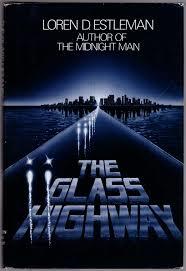 Howard: Loren Estleman’s “Greektown” was well composed, atmospheric, surprising, moving, and short as well, a fine capper to the collection.
Howard: Loren Estleman’s “Greektown” was well composed, atmospheric, surprising, moving, and short as well, a fine capper to the collection.
Chris: I can hardly say enough good things about Loren Estleman, whose Amos Walker series channels the classic flavor of the Chandleresque detective story better than anyone working today. The Glass Highway in particular is a fine novel. He turned in great work for Detroit Noir, giving us the memorable short story, “Kill the Cat,” which was up for a Shamus Award.
Howard: Well, I definitely plan to read more by him, and more by all of the writers in this discussion, and probably some that didn’t make it onto my “best of” list from what’s really a “best of” collection. It’s just a wonderful anthology, and if you have even a faint interest in private eye stories, you owe it to yourself to pick up a copy.
Next time up we’ll be discussing Wade Miller, and after that, Talmage Powell. See you in about a month!
May 17, 2017
Scheduling
 I’ve been trying to clear off my spinning plates before things get REALLY busy. I haven’t really managed it completely yet, owing to the fact I think I’m a little worn down from all the frantic stuff. It’s as though my mind is insisting on a longer break than I think I need. I keep letting my attention wander or focusing on the wrong things.
I’ve been trying to clear off my spinning plates before things get REALLY busy. I haven’t really managed it completely yet, owing to the fact I think I’m a little worn down from all the frantic stuff. It’s as though my mind is insisting on a longer break than I think I need. I keep letting my attention wander or focusing on the wrong things.
But after some downtime over the last few days my batteries feel a little recharged. Hocking and I are putting finishing touches on a new Hardboiled Monday article, and Bill Ward and I are talking about doing a Harold Lamb re-read of the first book of Khlit the Cossack stories.
I also got my finalized schedule of events for GenCon this year. I’m on some pretty nifty panels. And I need to sign up for some more conventions near year’s end and the start of next because lo and behold I’ll have a new book coming out next spring. Looking forward to getting notes from my editor on it this week.
In other, more mysterious news, both of my mystery projects are coming along, and man, am I excited about the sword-and-sorcery one. It’s all I can do to keep that one under wraps. I do look forward to sharing the details about them both with all of you.
For now, apple in hand (because I haven’t finished breakfast) it’s time to get to work.
Howard Andrew Jones's Blog
- Howard Andrew Jones's profile
- 368 followers



